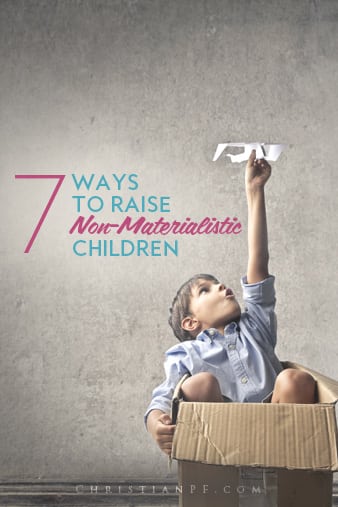 Ironically, many children raised in wealth demonstrate the same tendencies as those who are raised in extreme poverty: depression, despair, attempted suicide, drug and alcohol use, and shoplifting.
Ironically, many children raised in wealth demonstrate the same tendencies as those who are raised in extreme poverty: depression, despair, attempted suicide, drug and alcohol use, and shoplifting.
Why this behavior?
The parents, who are often too busy making money sacrifice meaningful time with their children.
Admittedly, raising children in a world obsessed with stuff is a tough, tough job.
As savvy advertisers target these kids from early youth, and as their peers are quick to sport whatever the latest and greatest may be, the parents must be vigilant in teaching their children that such possessions do not make one happy, and, in fact, are detrimental to true happiness.
So . . . in this materialistic society, how does one go about raising non-materialistic children?
These tips will help:
1Practice What You Preach
If you buy cars to impress others, shop regularly just to be shopping, and “have to have” whatever the latest electronic gadget might be, don’t bother reading the rest of this article. Why? Because what you do screams to your children louder than anything you can ever say.
Albert Schweitzer said it well, “There are only three ways to teach a child. The first is by example; the second is by example; the third is by example.” Your first step, therefore, is to purge materialism from the person you see in the mirror.
2Spend Time With Your Children
Do you find yourself giving gifts to your children to make up for lack of personal attention? If so, you are instead sending the message that you think stuff is more important than a close relationship. Let the “Cats In The Cradle” lyrics resonate deeply. This Harry Chapin classic is a haunting reminder that once those child rearing years are gone, you will never get them back.
Cherish every moment you can spend with your children.
3Rein in Your Christmases
Somehow, someway, many parents missed the memo: “Christmas is not a license to overly indulge your children.” No matter how you justify it, overspending on your children just because it is Christmas is still overspending on your children (be sure to get on a Christmas budget). Try celebrating the true spirit of Christmas with your children instead of piling up stuff for them.
Our children, who are now grown, still have fond memories of the hours we spent together baking cookies and making homemade Christmas cards to give the inmates at a local prison. Create your own family traditions that involve time together and giving to others. Your children will cherish those memories.
4Help Them Prioritize Their Own Money
As your children become old enough to have their own money, help them prioritize that money. A very simple plan is to give some, save some, and spend some.
If you emphasize giving, you will be helping your child develop a heart for others. Because giving is the opposite of materialism, you need to constantly demonstrate a giving spirit.
5Support a Child in a Poverty Nation
Need something for that “giving” money to go for? How about supporting a child in a third-world country. Children have a natural empathy for other children, so if your kids can support a child with real needs, they will not only learn to love that child, but will also appreciate whatever material possessions they already own.
6Take Them on Foreign Mission Trips
I have been fortunate enough to accompany all four of my children on short term mission trips to Mexico. Three went while in high school; the fourth as an adult.
Nothing, absolutely nothing will impact kids more than seeing poverty up close and personal. Amazingly, the lesson my kids came back with over and over again was how happy those people (who had nothing) were. Talk about an antidote to materialism . . . these short-term mission trips have been firsthand proof that stuff doesn’t equal happiness.
Check out this article if you need to raise money for your mission trip.
7Take a Field Trip to a Dump
I borrow this idea from Randy Alcorn’s book, Managing God’s Money. Show your children all these piles of “treasures” that were once Christmas and birthday presents. Discuss how everything we own today will likewise end up in a junkyard like this one. Read 2 Peter 3:10-14 together (a passage that tells of how everything in this world will some day burn), then use this teachable moment to discuss true riches which transcend life here on planet earth.
Ask them this question: “When everything we have ever owned is someday burned, what, in your lives, do you think will last forever?”
In what ways are you helping your children avoid materialism? What could you be doing better? Leave a comment!




